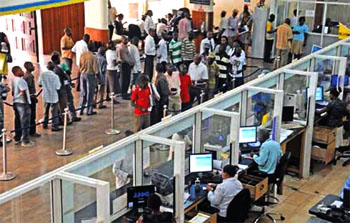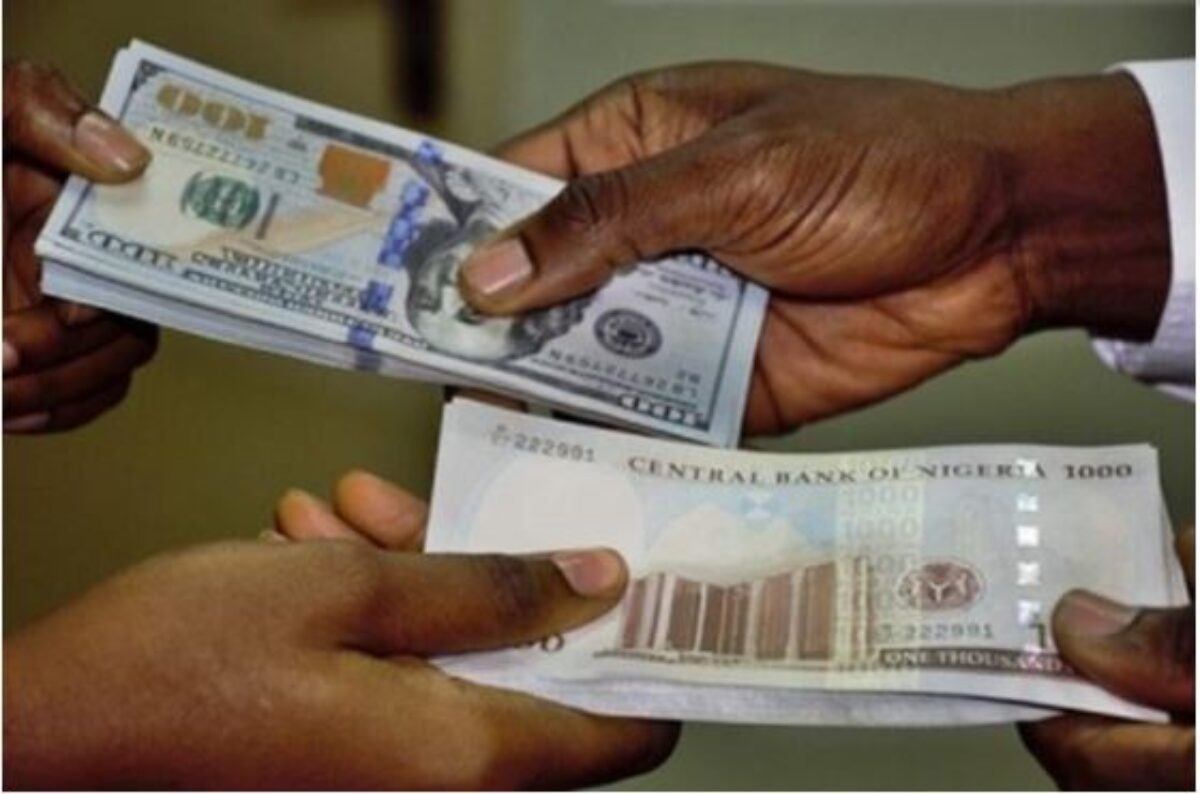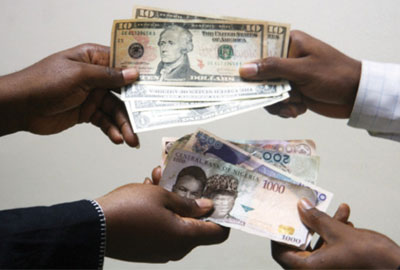Finance
CBN halts branch operations by bureaux de change

…to saction BDCs operating outside registered office
By Jonah Nwokpoku
LAGOS-THE Central Bank of Nigeria, CBN has ordered bureaux de change (BDCs) to close all branches within 90 days, saying branch operations is no longer allowed in the subsector. This directive was contained in the revised guidelines for BDCs released on Friday by the apex bank. According to the guidelines, issued via a circular titled: ‘Revised Operational Guidelines for Bureaux De Change in Nigeria’, “Bureau De Change is Licenced as a unit institution.
No Bureau De Change shall have a branch office outside its registered office. All Bureaux De Change that under the 2002 Guidelines have branches are required to close such branches within 90 days of the 2015 guidelines.”
The CBN also banned BDCs from business relationship with street traders in foreign currencuies. It stated: “Similarly, it shall be a ground for the revocation of Licence should any street trader in foreign currencies be found to have any business relationship with a Licenced BDC.
Application for licence
According to the circular, “A formal application to the CBN Governor to grant the promoters an Approval in Principle to carry on the business of a Bureau De Change in Nigeria (shall be made). The application should be addressed to the Director, Financial Policy and Regulation Department (FPRD), Central Bank of Nigeria. Applicants/promoters shall attach to their application the following documents:
A non-refundable application fee of N100, 000 or such other amount as may be determined by the Bank from time to time in bank draft payable to the Central Bank of Nigeria; Evidence of payment of the prescribed minimum capital of N35 million or any other amount as may be determined by the CBN from time to time, into the designated CBN account. The Bank shall refund this amount with interest after the proposed institution has obtained its final licence;
A copy of the draft Memorandum and Articles of Association; A letter of intent to subscribe to the shares of the proposed Bureau De Change signed by each subscriber; A copy of the list of the proposed shareholders in tabular form showing their business, and residential addresses and the names and addresses of their respective bankers, as well as the details of their Bank Verification Number (BVN).”
It further stated that, “Promoters shall reserve the proposed company’s name at the Corporate Affairs Commission (CAC) as no proposed Bureau De Change shall incorporate/register its name with the Corporate Affairs Commission until an approval-in-principle has been obtained from the CBN, a copy of which shall be presented to the Corporate Affairs Commission.”
Requirements for final licence
The circular further noted, “Not later than six months after the grant of AIP, the promoters of a proposed BDC shall submit application for the grant of a final licence to the Governor, Central Bank of Nigeria, Abuja, with the following documents: Evidence of payment of anon-refundable licencing fee of N1 million only or any other amount as may be determined by the CBN from time to time; the names, designations and signed Curricula Vitae (CV) of the proposed members of the top management; Evidence of incorporation of the company with CAC; evidence of payment of N35 million mandatory caution deposit, or any other amount as may be determined by the CBN from time to time, into a designated CBN account; evidence of having suitable office accommodation for the operation of the proposed BDC.”
Financial requirements
According to the circular, the financial requirements, which may vary at the discretion of the CBN, are as follows: “Minimum paid-up share capital-N35million; Non-refundable application fee-N100, 000; Non-refundable licensing fee-N1 million; Mandatory caution Deposit-N35 million; Non-refundable annual licensing renewal fee [payable not later than30 days after the end of each calendar year]-N250,000; Non-refundable change of name fee-N100, 000”
Operations of bureaux de change
On the operations of BDCs in Nigeria, the circular said: “Every BDC in Nigeria shall deal in bank notes and coins, plastic cards and such other businesses as the CBN may approve from time to time; The foreign currencies dealt in by a BDC shall be derived from private sources and such other sources which may include the CBN window as determined by the CBN from time to time for the purpose of funding Business Travel Allowance [BTA] and Personal Travel Allowance [PTA];
Any person/individual wishing to sell foreign currency above $10,000 or its equivalent to a BDC shall be required to disclose the source; Transactions shall be on spot basis (immediate settlement), adding “For the avoidance of doubt, forward transactions by BDCs are not allowed; The maximum amount per transaction for a BDC shall be determined from time to time by the CBN with respect to business and personal travel allowances.
The maximum amount currently for PTA and BTA per quarter is $4000 and $5000, respectively; All sales or purchases of foreign exchange shall be properly documented and recorded as may be required by the CBN. Such documents should be arranged sequentially and be made available to CBN and other regulatory authorities on demand, etc.”
Ground for licence revocation
The guidelines further stated: “Every BDC shall transact business at its registered office approved by the CBN as any BDC that operates outside its registered office shall be sanctioned. Similarly, it shall be a ground for the revocation of Licence should any street trader in foreign currencies be found to have any business relationship with a Licenced BDC. Every BDC shall fix its hours of business which shall be clearly displayed in its office.
Every BDC shall be required to open both domiciliary and Naira accounts with Authorized dealers in Nigeria and inform the CBN accordingly. The accounts shall be used solely for day to day operations.”
Non-permissible activities
According to the circular, non-permissible activities for BDCs include: “Engaging in off-shore business or maintaining foreign correspondence relationship; Engaging in any trade related import activities; Maintaining a foreign account in whatever form; Round-tripping of foreign exchange [currency] acquired through the CBN window; Street trading of foreign exchange; Carrying on capital market activities; Any other activity as may from time to time be termed “non-permissible” by the CBN.”
It also warned that “Bureau De Change is licenced as a unit institution” And as such, “no Bureau De Change shall have a branch office outside its registered office. All Bureaux De Change that under the 2002 Guidelines have branches are required to close such branches within 90 days of the 2015 guidelines.”
Vanguard
Business
Nigeria pays US$4.9 billion on petrol subsidy in 2024- NNPCL
It was however noted by Biztellers.com.ng, that although subsidy is back in effect, the main reason for that is the increasingly weak state of the Naira and the country’s extreme dependence on products importation. Also unlike the previous subsidy era, where several oil marketers were getting free subsidy refunds for unverified product importation, this subsidy era is witnessing only one importer, the NNPCL, which in effect is the sole receiver of government subsidies.
Yemie ADEOYE
INSPITE of the official position of the Nigerian government that the controversial petrol subsidy is gone for good as announced by the President on assumption of office, the state owned Nigerian National Petroleum Corporation Limited, NNPCL has disclosed that petrol subsidy is still fully operational in Nigeria, although, under a different identity.
Umar Ajiya, Chief Financial Officer at the NNPCL, disclosed that it cost the company a staggering N7.8 trillion (US$4.9) to cover this price gap in the first seven months of 2024.
Rather than simply referring to these claims as subsidies, he stated that the company is merely managing the price difference in petrol imports on behalf of the federation, stressing that this should not be misconstrued as a return to subsidy payments.
![]() This revelation has reignited discussions on whether the NNPC is indirectly offering subsidies, a concept typically defined as selling a product below its cost price.
This revelation has reignited discussions on whether the NNPC is indirectly offering subsidies, a concept typically defined as selling a product below its cost price.
Documents reviewed by Biztellers.com.ng showed that the term “subsidy” was used extensively in official correspondence between the NNPCL and the presidency, particularly in reference to the “shortfall.”
Recall that President Bola Tinubu reportedly approved NNPC’s request to utilize the 2023 final dividends due to the federation to offset these costs.
However, during a media briefing on Monday about the company’s 2023 audited financial statements, Ajiya refuted claims that the NNPC is involved in any subsidy scheme.
Ajiya further disclosed that the Nigerian government owes the NNPC N7.8 trillion ($4.9 billion) in subsidy-related debts for the period from January to July 2024.
In furtherance of his clarification to the News Agency of Nigeria (NAN), Ajiya insisted that no subsidy payments have been made to any marketer in the last nine years, citing the NNPC’s role as the sole importer of petrol under supply contracts.
He said, “In the last eight to nine years, NNPC Ltd. has not paid anyone a dime as a subsidy; no kobo has been disbursed by NNPC Ltd. in the name of subsidy. No marketer has received any payment from us for subsidy.”
“What has been happening is that we have been importing PMS, which has been landing at a specific cost price, and the government tells us to sell it at half price. So the difference between the landing price and that half price is a shortfall.
“And the deal is between the Federation and NNPC Ltd., to reconcile, sometimes they give us money, so there is no money exchanging hands with any marketer in the name of subsidy.”
Ajiya remained silent on how much of the $4.9 billion could have been remitted to the federation account if the NNPC had not been covering the “shortfall.”
It was however noted by Biztellers.com.ng, that although subsidy is back in effect, the main reason for that is the increasingly weak state of the Naira and the country’s extreme dependence on products importation. Also unlike the previous subsidy era, where several oil marketers were getting free subsidy refunds for unverified product importation, this subsidy era is witnessing only one importer, the NNPCL, which in effect is the sole receiver of government subsidies.
Banking
CBN Denies Currency Devaluation

The Central Bank of Nigeria (CBN) has refuted claims of devaluing the.
Earlier reports suggested that the CBN had devalued the Naira, lowering its exchange rate from N631 to the dollar, compared to the previous day’s rate of N461.60 at the Importers and Exporters (I&E) window.
However, the Central Bank of Nigeria (CBN) released a statement on Thursday through its Acting Head of Corporate Communications, Dr. Isa Abdulmumin, categorizing the report as false information.
In the statement titled ‘CBN Has Not Devalued The Naira’, he said the attention of the apex bank was drawn to the news report by an Abuja based newspaper edition of June 1, 2023, titled “CB Devalues Naira To 630/51”.
However, the CBN stated categorically that the news report was replete with outright FALSEHOODS and destabilizing innuendos, ‘reflecting potentially willful ignorance of the said medium as to the workings of the Nigerian Foreign Exchange Market.’
“For the avoidance of doubt, the exchange rate at the Investors’ & Exporters (I&E) window traded this morning (June 1, 2023) at N465/USS1 and has been stable around this rate for a while.
“The public is hereby advised to ignore the news report by Daily Trust in its entirety, as it is speculative and calculated at causing panic in the market,” the CBN spokesman added.
He, therefore, advised media practitioners to verify their facts from the Central Bank of Nigeria before publishing in order not to misinform the public.
Banking
BREAKING: CBN Increases Interest Rate By 0.5%

The interest rate in Nigeria has been raised to 18.5 percent, up by 0.5 percent, from 18 percent where it was pegged in March 2023.
The Central Banks of Nigeria’s (CBN) Monetary Policy Committee (MPC) resolved to this effect at its third meeting of 2023 in Abuja, on Wednesday.
Governor, CBN, Godwin Emefiele, made the disclosure in the communiqué of the MPC’s meeting, thereafter.
While engaging the media at the end of the two-day meeting, Emefiele, said the committee voted to keep the asymmetric corridor at +100 and -700 basis points around the MPR.
In the view of the MPC, rising inflation rate is traceable to the high energy cost and challenges around the supply chain, among others, which lie outside the corridors of the CBN.
Emefiele said, “The current trend in price development would continue to be monitored by the bank with greater collaboration with fiscal authority to address the drivers of inflation.”
Biztellers reports that the CBN had effected six consecutive interest rate increases, which has seen the rate move from 11.5 percent in March 2022 to 18.5 percent in May 2023.


















